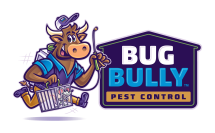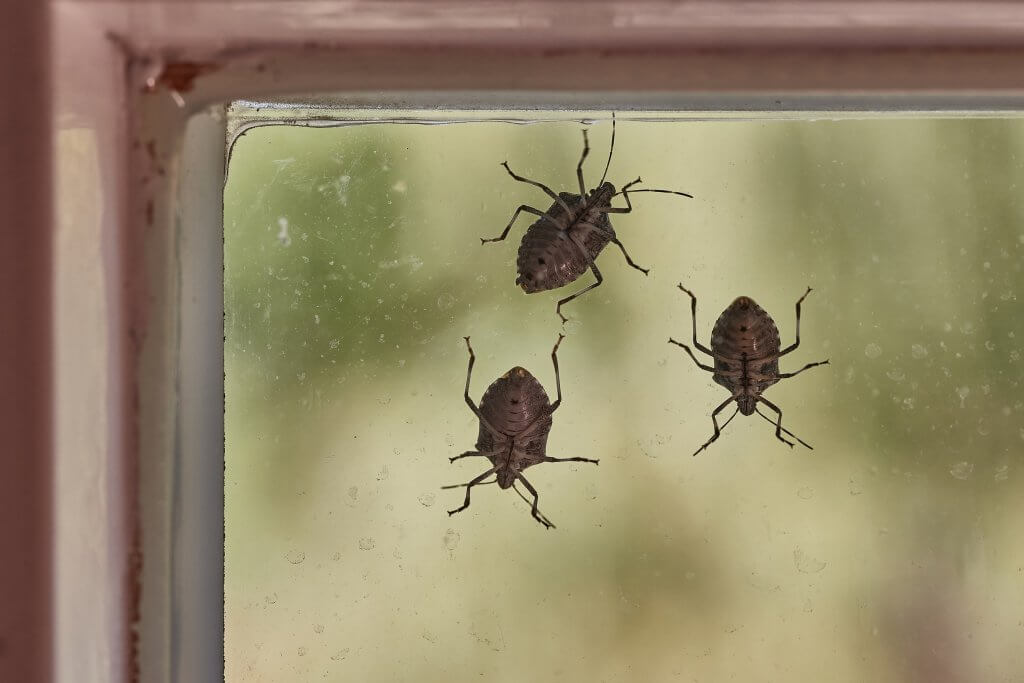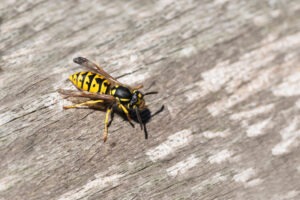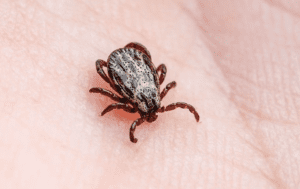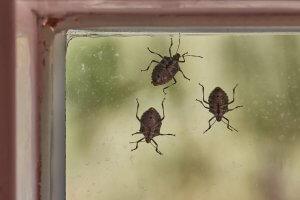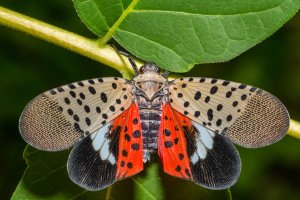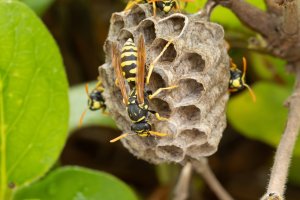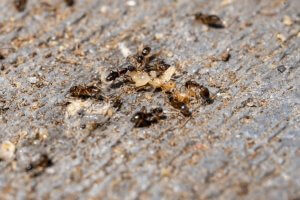If you live in Worcester, Framingham, Northborough, Concord, or anywhere across Central Massachusetts, chances are you’ve had an encounter with a stink bug. Whether you’ve seen one crawling along a window in your living room or swooping down toward a table of outdoor diners, these shield-shaped insects are increasingly hard to ignore.
At first glance, stink bugs look harmless enough. They don’t bite, sting, or carry diseases. But anyone who has accidentally squished one knows where they get their name. Their odor is strong, lingering, and downright unpleasant. For homeowners and restaurant owners, the real problem is how many stink bugs can gather in one place and how difficult it is to keep them out once the weather turns cool.
At Bug Bully Rodent & Pest Control, we want to make sure families, renters, and business owners understand the threat of stink bugs, what attracts them, and how professional stink bug control can keep them at bay.
What are Stink Bugs?
The brown marmorated stink bug (Halyomorpha halys) is an invasive insect originally from Asia. It was accidentally introduced to the United States in the mid-1990s and has spread across the country since. Massachusetts is no exception, and Central Massachusetts communities have reported rising numbers year after year.
Stink bugs are recognizable by their shield-like shape, mottled brown color, and long antennae. Adults are about half an inch long. They feed on a wide range of plants, piercing fruits, vegetables, and ornamental plants with their mouthparts.
Their name comes from the pungent odor they release when threatened or crushed. This smell is a defense mechanism, deterring predators. Unfortunately for humans, it is also very noticeable in enclosed spaces.
Why Stink Bugs Matter in Central Massachusetts
Homeowners and renters often encounter stink bugs in fall, when the insects are searching for warm places to overwinter. They squeeze into homes, apartments, garages, and attics through even the tiniest cracks. While they do not breed indoors, they can gather in large numbers, making homes uncomfortable.
For restaurant owners, stink bugs are not just a nuisance but a reputational risk. Imagine a customer at an outdoor café in Framingham finding one on the edge of their plate, or diners in Concord noticing stink bugs landing on an umbrella above their heads. The unpleasant odor associated with stink bugs only makes matters worse.
In addition to their nuisance indoors, stink bugs can also damage gardens and landscaping plants, sucking juices from tomatoes, peppers, apples, and ornamental plants.
How to Identify a Stink Bug
Knowing what to look for is key to early stink bug control.
- Adults: About half an inch long, shaped like a shield, and mottled brown with lighter and darker patches. Their underside may be lighter, and they have distinctive alternating dark and light patterns on their antennae and edges of the abdomen.
- Nymphs: Smaller, rounder, and more brightly colored, often with orange or red markings that fade as they mature.
- Behavior: Stink bugs are slow-moving and may buzz clumsily through the air. They are most noticeable when they gather on sunny sides of buildings in the fall or crawl along windows indoors during cooler months.
If you see one or two, chances are there are more nearby.
The Impact on Homeowners
For homeowners and apartment renters, stink bugs can feel like unwelcome guests that simply will not leave. They tend to enter houses in large numbers during the fall as they seek shelter. Once inside, they may cluster in attics, crawl spaces, or behind walls. By winter, they are often seen crawling around warm areas of the home.
Although they don’t bite or damage structures, their odor is unpleasant, and their sheer numbers make them a significant nuisance. Vacuuming them up often spreads the smell, and squishing them only makes it worse. Their presence can also feel embarrassing when guests notice them.
Gardeners are also affected. Stink bugs feed on a wide range of fruits and vegetables, leaving small necrotic spots on produce. Tomatoes, peppers, beans, and apples are common targets.
The Impact on Restaurants
For restaurants in Worcester, Northborough, and Concord, stink bugs create a two-fold problem. First, they impact outdoor dining. Patrons enjoying meals under umbrellas or on patios may find stink bugs buzzing around lights or perching on tablecloths. Few things disrupt a meal faster than the appearance of an insect known for its unpleasant smell.
Second, stink bugs can enter kitchens or storage areas if buildings are not sealed properly. While they don’t contaminate food in the same way as cockroaches or rodents, their presence is unappealing to staff and diners alike. Cleanliness and reputation are essential to every restaurant, and an infestation, even if harmless, can create the wrong impression.
Stink Bug Control in Massachusetts
Because stink bugs are primarily a nuisance pest, control strategies focus on exclusion and removal rather than eradication. Professional stink bug control in Massachusetts includes:
- Careful inspections of the building exterior to identify entry points.
- Sealing cracks around windows, doors, siding, and utility openings.
- Installing door sweeps and window screens where needed.
- Safe removal of stink bugs that have already entered.
- Targeted treatments around vulnerable entry areas to discourage large aggregations.
Home remedies such as crushing, sweeping, or vacuuming are rarely effective on their own. In fact, these can worsen the odor problem. A professional stink bug exterminator provides long-term strategies tailored to homes and businesses.
Fun Facts About Stink Bugs
- Their odor comes from specialized glands on their abdomen that release a chemical deterrent.
- The brown marmorated stink bug has more than 100 host plants it can feed on.
- Stink bugs are excellent hitchhikers, often traveling on vehicles or packages.
- They are attracted to light, which is why you often see them around windows or outdoor lamps.
- Some people describe their smell as cilantro-like, while others find it closer to rotten vegetables.
Common Questions Answered
Do stink bugs bite?
No, stink bugs do not bite or sting. They use their mouthparts to pierce plants, not people.
Why do I see more stink bugs in the fall?
Fall is when stink bugs seek out warm places to survive the winter. Houses, apartments, and restaurants provide the perfect shelter.
Can stink bugs damage my home?
They don’t chew wood or destroy structures like termites, but they can damage gardens and fruit trees by feeding on crops.
What happens if I squish a stink bug?
Squishing a stink bug releases its odor. It won’t harm you, but it leaves an unpleasant smell that can linger.
How can restaurants prevent stink bugs?
Restaurants can work with a stink bug exterminator to seal entry points, reduce outdoor lighting that attracts them, and implement treatments to keep populations low.
The Long-Term Outlook in Massachusetts
Stink bugs are here to stay in Massachusetts. The climate suits them well, and they have adapted to both rural and urban environments. The key is not eradication but management. By taking proactive steps each fall, homeowners and restaurants can prevent large infestations and reduce the likelihood of unpleasant encounters.
Communities in Worcester County and Middlesex County have already seen seasonal spikes. Awareness and early action remain the most effective tools.
What Bug Bully Rodent & Pest Control Recommends
If you live in Worcester, Framingham, Northborough, or Concord, the best approach is to act before stink bugs move in for the season. At Bug Bully Rodent & Pest Control, we recommend:
- Scheduling an inspection in late summer or early fall to identify potential entry points.
- Sealing cracks, gaps, and utility openings before cool weather sets in.
- Considering professional exterior treatments to reduce the number of stink bugs gathering on your property.
- Avoiding crushing stink bugs indoors. Instead, contact a professional for safe removal.
By combining exclusion, prevention, and treatment, we provide comprehensive stink bug control that keeps your property comfortable and odor-free.
A Final Word
Stink bugs may not be dangerous, but they are disruptive and unpleasant. For homeowners, they represent a seasonal invasion that can make fall and winter less comfortable. For restaurants, they pose a risk to reputation and customer experience.
The good news is that professional stink bug exterminator services in Massachusetts are effective and affordable. At Bug Bully Rodent & Pest Control, we have the expertise to identify problem areas, protect your property, and keep stink bugs outside where they belong.
If you’re tired of dealing with these smelly intruders, let us help. With preparation and professional support, you can enjoy your home or business without the worry of stink bugs becoming uninvited guests.
